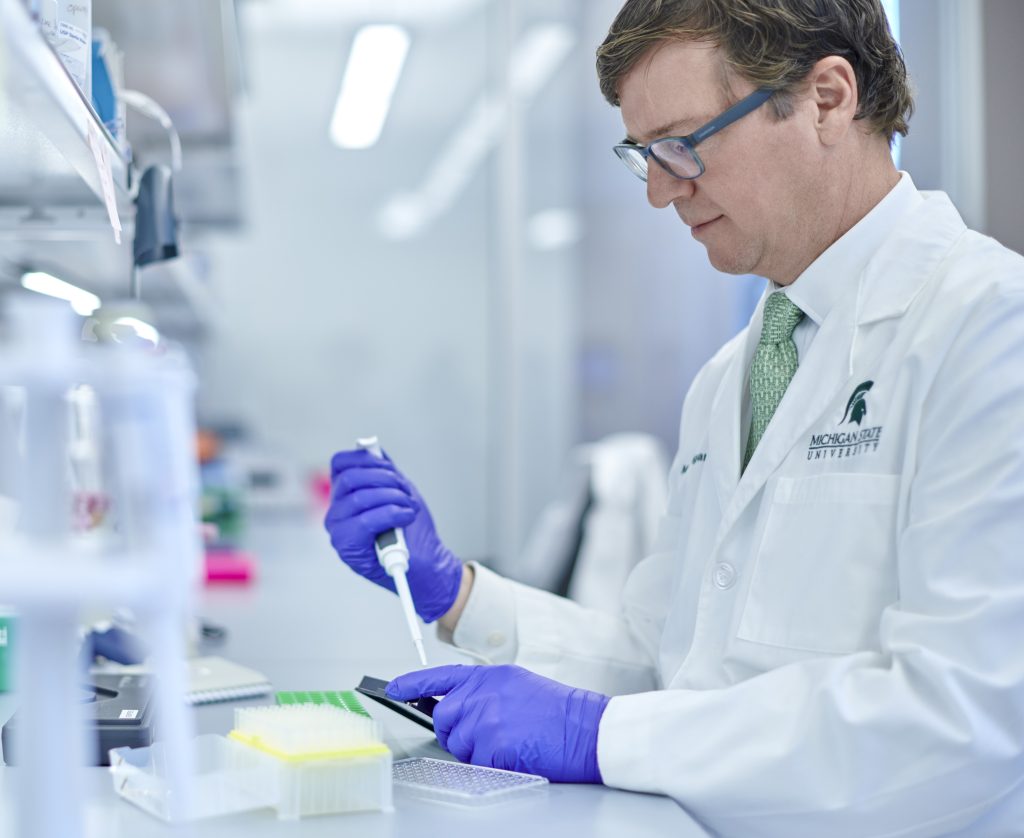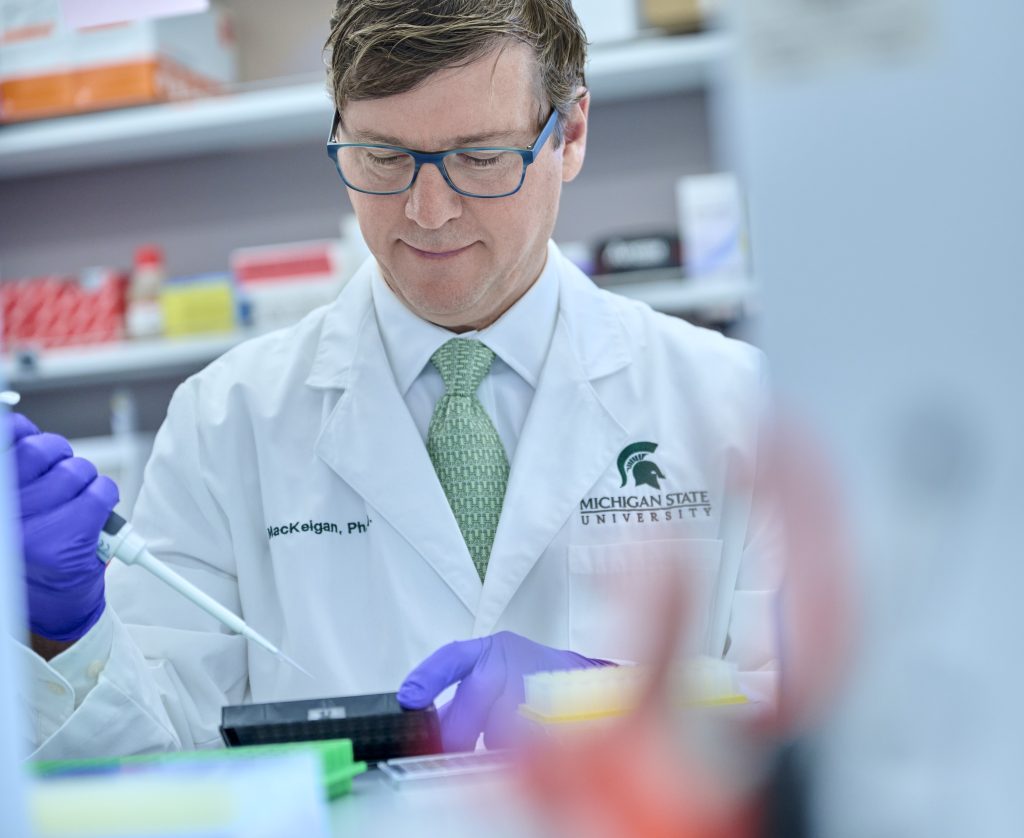The process of creating new pharmaceuticals is time-consuming and expensive. Discovering a new drug and bringing it to market can take 10-15 years and costs upwards of $2.5 billion, making traditional drug discovery an area primed for innovation. Dr. Jeff MacKeigan, Assistant Dean for Research in the College of Human Medicine and Professor in the Department of Pediatrics & Human Development, is hoping his collaboration with technology-enabled pharmaceutical company, Atomwise Inc., will improve the science behind the initial stages of oncological drug discovery.
The crossroads of medicine and AI
The process of creating new pharmaceuticals is time-consuming and expensive. Discovering a new drug and bringing it to market can take 10-15 years and costs upwards of $2.5 billion, making traditional drug discovery an area primed for innovation. Dr. Jeff MacKeigan, Assistant Dean for Research in the College of Human Medicine and Professor in the Department of Pediatrics & Human Development, is hoping his collaboration with technology-enabled pharmaceutical company Atomwise Inc. will improve the science behind the initial stages of oncological drug discovery.
MacKeigan’s lab works in the earliest stages of the drug discovery process, which aims to identify target proteins within cancer cells and then identify small molecule inhibitors that match the target’s structure. “Historically, the pharmaceutical industry would identify a lead target and then screen millions of compounds biochemically, one at a time,” MacKeigan said. However, in collaboration with Atomwise’s AtomNet® technology, MacKeigan’s lab can now virtually screen millions of compounds and narrow down the numbers to assess experimentally in the lab.
“In a lab, you identify a lead target and then screen millions of compounds biochemically”…Those compounds are then fed into atomwise’s algorithm. Prior to collaborating with atomwise, processing and screening compounds could take years.
– Dr. Jeff MacKeigan, Assistant Dean for Research. College of Human Medicine, Professor, Department of Obstetrics, Gynecoloy and Reproductive Biology and Pediatrics & Human Development
Founded in 2012, Atomwise invented the first applied convolutional neural net (CNN) technology for drug discovery, the AtomNet® platform. CNN technology is a type of artificial intelligence (AI) featuring deep learning algorithms that are well- suited for image classification and object detection. CNN technology is often used in computer vision applications such as facial recognition as well as in self-driving cars. An additional benefit of utilizing CNN is that the algorithm continues to improve with use. Thus, with each new test, the AI can improve its capability to identify more accurate matches and provide better results. The more the algorithm is tested, the closer researchers get to identifying binders to targets.

MacKeigan’s lab discovers novel drug targets in cancer cells required for cancer cell growth and survival, explores the drug target’s molecular structure in detail, and then provides 3D conformational structures of high-priority targets that are fed into Atomwise’s AtomNet® model. AtomNet’s CNN then proceeds to screen billions of compounds virtually in a matter of hours. The lead molecules identified by AtomNet, whose structure could potentially bind to the target structure, are then sent back to MacKeigan’s lab for further validation and clinical development. “Atomwise sends us those lead small molecules that potentially bind in the 3D pocket. Then we test them in the lab, both biochemically and in mutant cancer cells,” MacKeigan said. The AI then optimizes and learns about molecules with optimal drug docking poses across numerous previous projects, effectively improving future results.
However, the goal of Atomwise’s academic collaborations is not just to discover drugs, but to also expand our understanding of the fundamental biology of their protein targets. “We want to get at the underlying mechanism causing our targets to behave the way that they do, so we can find binders to those targets,” said Dr. Stephanie Hare, Computational Chemist at Atomwise. The collaboration between MacKeigan and Atomwise aims to further explore drug chemical space and optimize around those high-priority 3D structures. MacKeigan and his lab eventually hope to find one or more compounds that are inhibitors of the drug target, which could potentially lead to new cancer treatments.
“Where we’ve seen our technology excel is to challenge some of that domain expertise of antibodies, to look at areas that normally wouldn’t be considered appropriate for a small molecule, and we’ve had success doing that.”
– Terrence O’Brien, Associate Director at Atomwise
Atomwise has collaborated with over 400 academic researchers through the Artificial Intelligence Molecular Screen (AIMS) program, which was first launched in 2017 to broaden the pool of scientists involved in drug discovery through access to Atomwise’s AI-enabled discovery engine. MacKeigan has received three AIMS awards from Atomwise for his research in cancer drug discovery. His work continues to impress the company, and a solid partnership has been established.

“It is extremely important for the AIMS program’s success to be working with partners that are rigorous in terms of their science and good partners on a scientific project,” said Hare. “It speaks volumes that we have multiple projects with Jeff because there are very few [researchers] for which we continue those partnerships.”
It is still uncertain when or if MacKeigan’s work will lead to new therapeutics to combat cancer. “It is not clear yet if the compounds identified are interesting tool compounds that we can help understand the disease better or if they really have the ability to advance forward,” said Associate Director at Atomwise, Terrence is clear, however, is that the collaboration between Dr. MacKeigan and Atomwise is revolutionizing the earliest stages of the drug discovery process and may lead to new therapies in the future.


